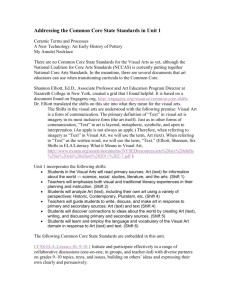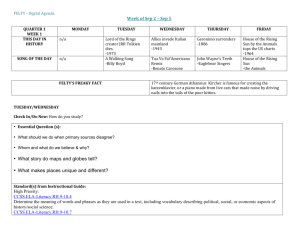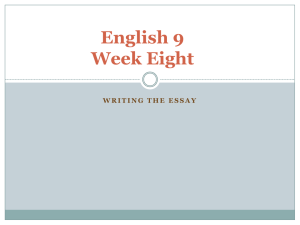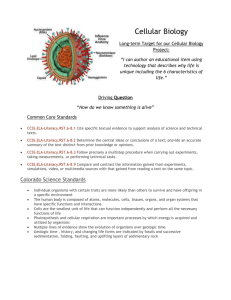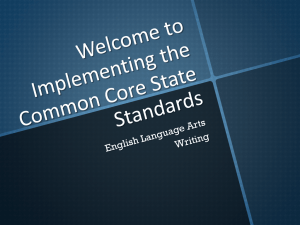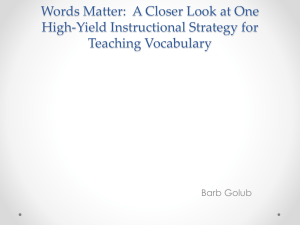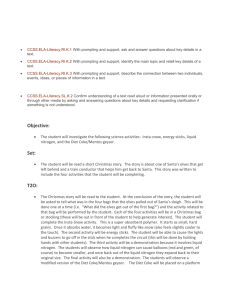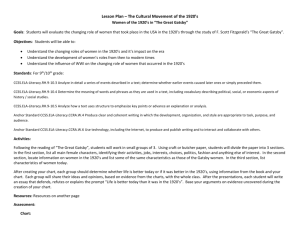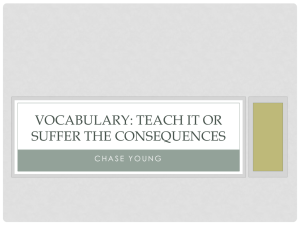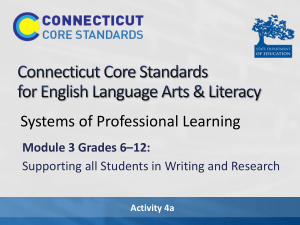File - Ouchi World History
advertisement
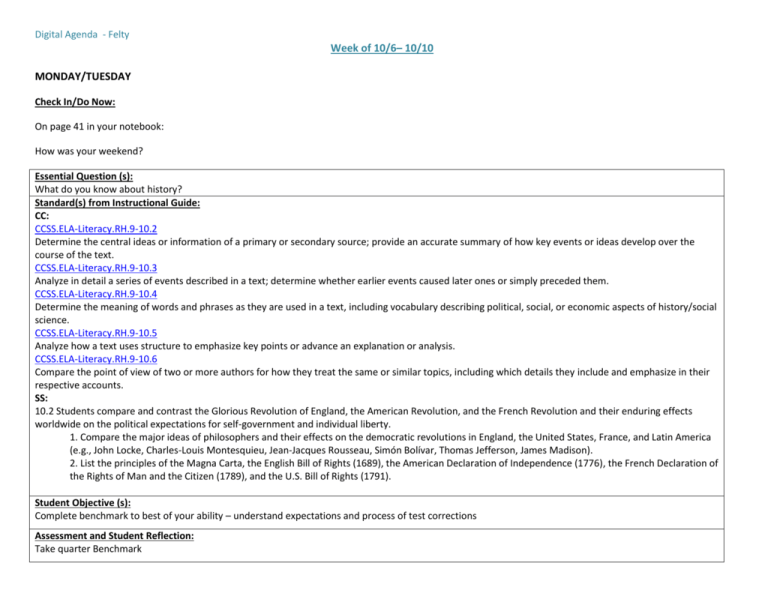
Digital Agenda - Felty Week of 10/6– 10/10 MONDAY/TUESDAY Check In/Do Now: On page 41 in your notebook: How was your weekend? Essential Question (s): What do you know about history? Standard(s) from Instructional Guide: CC: CCSS.ELA-Literacy.RH.9-10.2 Determine the central ideas or information of a primary or secondary source; provide an accurate summary of how key events or ideas develop over the course of the text. CCSS.ELA-Literacy.RH.9-10.3 Analyze in detail a series of events described in a text; determine whether earlier events caused later ones or simply preceded them. CCSS.ELA-Literacy.RH.9-10.4 Determine the meaning of words and phrases as they are used in a text, including vocabulary describing political, social, or economic aspects of history/social science. CCSS.ELA-Literacy.RH.9-10.5 Analyze how a text uses structure to emphasize key points or advance an explanation or analysis. CCSS.ELA-Literacy.RH.9-10.6 Compare the point of view of two or more authors for how they treat the same or similar topics, including which details they include and emphasize in their respective accounts. SS: 10.2 Students compare and contrast the Glorious Revolution of England, the American Revolution, and the French Revolution and their enduring effects worldwide on the political expectations for self-government and individual liberty. 1. Compare the major ideas of philosophers and their effects on the democratic revolutions in England, the United States, France, and Latin America (e.g., John Locke, Charles-Louis Montesquieu, Jean-Jacques Rousseau, Simón Bolívar, Thomas Jefferson, James Madison). 2. List the principles of the Magna Carta, the English Bill of Rights (1689), the American Declaration of Independence (1776), the French Declaration of the Rights of Man and the Citizen (1789), and the U.S. Bill of Rights (1791). Student Objective (s): Complete benchmark to best of your ability – understand expectations and process of test corrections Assessment and Student Reflection: Take quarter Benchmark WHOLE GROUP 1. 2. 3. 4. 5. Do Now Benchmarks Return Test Test Corrections Homework DIRECT STATION COLLABORATIVE STATION INDEPENDENT STATION WEDNESDAY Check In/Do Now: On page 41 in your notebook: What is feminism? Do you support it? Why or why not? Essential Question (s): What is feminism and why do people feel strongly about it? Standard(s) from Instructional Guide: CC: CCSS.ELA-Literacy.RH.9-10.2 Determine the central ideas or information of a primary or secondary source; provide an accurate summary of how key events or ideas develop over the course of the text. CCSS.ELA-Literacy.RH.9-10.3 Analyze in detail a series of events described in a text; determine whether earlier events caused later ones or simply preceded them. CCSS.ELA-Literacy.RH.9-10.4 Determine the meaning of words and phrases as they are used in a text, including vocabulary describing political, social, or economic aspects of history/social science. CCSS.ELA-Literacy.RH.9-10.5 Analyze how a text uses structure to emphasize key points or advance an explanation or analysis. CCSS.ELA-Literacy.RH.9-10.6 Compare the point of view of two or more authors for how they treat the same or similar topics, including which details they include and emphasize in their respective accounts. SS: 10.2 Students compare and contrast the Glorious Revolution of England, the American Revolution, and the French Revolution and their enduring effects worldwide on the political expectations for self-government and individual liberty. 1. Compare the major ideas of philosophers and their effects on the democratic revolutions in England, the United States, France, and Latin America (e.g., John Locke, Charles-Louis Montesquieu, Jean-Jacques Rousseau, Simón Bolívar, Thomas Jefferson, James Madison). 2. List the principles of the Magna Carta, the English Bill of Rights (1689), the American Declaration of Independence (1776), the French Declaration of the Rights of Man and the Citizen (1789), and the U.S. Bill of Rights (1791). Student Objective (s): Understand the motives behind Emma Watson’s HeForShe campaign Pick groups and philosopher for Research Project. Assessment and Student Reflection: Complete a SOAPSTone and Say Mean Matter for Ms Watson’s HeForShe campaign speech. 1. 2. 3. 4. WHOLE GROUP Do Now Introducing the Research Project: Infographic about an Enlightenment Thinker Connecting the Timeline: Women’s Rights in the Dark Ages vs Today Current Event with SOAPSTone: HeForShe DIRECT STATION COLLABORATIVE STATION Current Event Researcher Dictionary Translator Everyone must finish the Current Event and turn in individual Current Events. All materials listed under: Current Events > 10/8 HeForShe: United Nations THURSDAY/FRIDAY Check In/Do Now: INDEPENDENT STATION On page 41 in your notebook: Why do people philosophize? Essential Question (s): How did the Renaissance reawaken European intellectualism? Standard(s) from Instructional Guide: CC: CCSS.ELA-Literacy.RH.9-10.2 Determine the central ideas or information of a primary or secondary source; provide an accurate summary of how key events or ideas develop over the course of the text. CCSS.ELA-Literacy.RH.9-10.3 Analyze in detail a series of events described in a text; determine whether earlier events caused later ones or simply preceded them. CCSS.ELA-Literacy.RH.9-10.4 Determine the meaning of words and phrases as they are used in a text, including vocabulary describing political, social, or economic aspects of history/social science. CCSS.ELA-Literacy.RH.9-10.5 Analyze how a text uses structure to emphasize key points or advance an explanation or analysis. CCSS.ELA-Literacy.RH.9-10.6 Compare the point of view of two or more authors for how they treat the same or similar topics, including which details they include and emphasize in their respective accounts. SS: 10.2 Students compare and contrast the Glorious Revolution of England, the American Revolution, and the French Revolution and their enduring effects worldwide on the political expectations for self-government and individual liberty. 1. Compare the major ideas of philosophers and their effects on the democratic revolutions in England, the United States, France, and Latin America (e.g., John Locke, Charles-Louis Montesquieu, Jean-Jacques Rousseau, Simón Bolívar, Thomas Jefferson, James Madison). 2. List the principles of the Magna Carta, the English Bill of Rights (1689), the American Declaration of Independence (1776), the French Declaration of the Rights of Man and the Citizen (1789), and the U.S. Bill of Rights (1791). Student Objective (s): Analyze the basic concepts brought forth by Enlightenment thinkers Connect Renaissance “rebirth” of thinking to Enlightenment ideals Assessment and Student Reflection: Collaborative: Say Mean Matter Direct: CEL paragraph WHOLE GROUP 1. 2. 3. 4. Do Now/HW Check “Reading” Quiz: Crash Course Dark Ages Connecting the Timeline BLAST a. Direct: The Influence of the Renaissance b. Independent: Say Mean Matter, Enlightenment Thinkers 5. Refection DIRECT STATION Expected Output: Complete CEL paragraph answering: What ideas from the Dark Ages were changed during the Renaissance in Europe? COLLABORATIVE STATION Expected Output: Complete a Say Mean Matter of a primary source by your chosen Enlightenment thinker that will be put on your infographic. All materials listed under: Today’s Activities > World History > Direct All materials listed under: Today’s Activities > World History > Collaborative Past 10/10/14: Archive > Unit 3: Enlightenment > Oct 9/10 Direct Past 10/10/14: Archive > Unit 3: Enlightenment > Infographic Project Materials INDEPENDENT STATION
